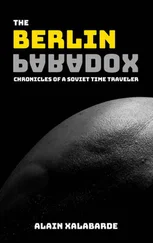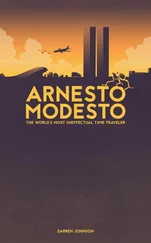James Gleick - Time Travel
Здесь есть возможность читать онлайн «James Gleick - Time Travel» — ознакомительный отрывок электронной книги совершенно бесплатно, а после прочтения отрывка купить полную версию. В некоторых случаях можно слушать аудио, скачать через торрент в формате fb2 и присутствует краткое содержание. Год выпуска: 2016, Издательство: Knopf Doubleday Publishing Group, Жанр: Старинная литература, на английском языке. Описание произведения, (предисловие) а так же отзывы посетителей доступны на портале библиотеки ЛибКат.
- Название:Time Travel
- Автор:
- Издательство:Knopf Doubleday Publishing Group
- Жанр:
- Год:2016
- ISBN:нет данных
- Рейтинг книги:5 / 5. Голосов: 1
-
Избранное:Добавить в избранное
- Отзывы:
-
Ваша оценка:
- 100
- 1
- 2
- 3
- 4
- 5
Time Travel: краткое содержание, описание и аннотация
Предлагаем к чтению аннотацию, описание, краткое содержание или предисловие (зависит от того, что написал сам автор книги «Time Travel»). Если вы не нашли необходимую информацию о книге — напишите в комментариях, мы постараемся отыскать её.
Time Travel — читать онлайн ознакомительный отрывок
Ниже представлен текст книги, разбитый по страницам. Система сохранения места последней прочитанной страницы, позволяет с удобством читать онлайн бесплатно книгу «Time Travel», без необходимости каждый раз заново искать на чём Вы остановились. Поставьте закладку, и сможете в любой момент перейти на страницу, на которой закончили чтение.
Интервал:
Закладка:
As a graduate student, bored by the dissertation he was supposed to be preparing, he invented a chemistry paper titled “The Endochronic Properties of Resublimated Thiotimoline,” complete with charts, graphs, and citations of nonexistent journals. *2The paper describes a made-up substance, thiotimoline, derived from the imaginary bark of a fictitious shrub, which has a mind-bending property dubbed “endochronicity”: when placed in water, it dissolves before its crystals touch the water. The way quantum mechanics was going, this was only mildly preposterous. Asimov explained it by giving the molecule a peculiar geometrical structure in spacetime: while some of its chemical bonds lie in the usual spatial dimensions, one of them projects into the future and another into the past. You can imagine the possibilities for this quirky crystal. Later, Asimov wrote another paper about its micropsychiatric applications. *3
He was soon averaging three to four books a year, but apart from the stage-setting blast to the future in Pebble in the Sky, he had not tried time travel. The idea that led to The End of Eternity came in 1953, when he found a set of bound volumes of Time magazine in the stacks of the Boston University library and started reading them through—systematically, from 1928 onward. In one of those early volumes, he was startled to see an advertisement featuring a line drawing with the unmistakable mushroom cloud of a nuclear blast, an image much in people’s minds in the fifties, but not in the twenties and thirties. When he looked again, he realized he was actually looking at a drawing of the Old Faithful geyser, but by then his mind had already leapt to the only other possibility: time travel. Suppose the anachronistic mushroom cloud was some sort of message, sent by a desperate time traveler.
In devising his first novel of time travel, Asimov took the genre in a new direction. This is not the usual hero going on an adventure, hurling himself forth to the future or back to the past. It’s a whole universe restructured.
The End of Eternity begins as a play on words, because the one thing everyone knows about eternity is that it has no end. Eternity is everlasting. Traditionally, eternity is God. Or God’s bailiwick. (At least in the Judeo-Christian and Islamic traditions, where He is not just eternal but also singular, masculine, and uppercase.) “What times existed which were not brought into being by you?” Augustine asked the Lord in his Confessions. “In the sublimity of an eternity which is always in the present, you are before all things past and transcend all things future, because they are still to come.” We mortals live in time, but God is beyond that. Timelessness is one of His best powers.
Time is a feature of creation, and the creator remains apart from it, transcendent over it. Does that mean that all our mortal time and history is, for God, a mere instant—complete and entire? For God outside of time, God in eternity, time does not pass; events do not occur step by step; cause and effect are meaningless. He is not one-thing-after-another, but all-at-once. His “now” encompasses all time. Creation is a tapestry, or an Einsteinian block universe. Either way, one might believe that God sees it entire. For Him, the story does not have a beginning, middle, and end.
But if you believe in an interventionist god, what does that leave for him to do? A changeless being is hard for us mortals to imagine. Does he act ? Does he even think ? Without sequential time, thought—a process—is hard to imagine. Consciousness requires time, it seems. It requires being in time. When we think, we seem to think consecutively, one thought leading to another, in timely fashion, forming memories all the while. A god outside of time would not have memories. Omniscience doesn’t require them.
Perhaps instead an immortal deity is with us in time, enjoying experience, working his will. He sends plagues upon Pharaoh and great winds into the sea, and when the need arises, he sends angels or hornets. Jews and Christians say, “It came to pass in process of time, that the king of Egypt died: and the children of Israel sighed by reason of the bondage….And God heard their groaning, and God remembered His covenant with Abraham.” Some theologians would say that when Augustine was confessing, God was listening, and now He remembers. They would say that past is past, for us and for God. If God interacts with our world, it could be in a way that respects our memories of the past and expectations for the future. Perhaps when we discovered time travel, He was suitably amused.
These are deep waters. Even within the Abrahamic religions, theologians have found many divergent ways to speak of God’s time or timelessness. All religions, one way and another, conceive of entities whose relation to time transcends our own. “There are two forms of Brahman, time and the timeless,” says one Upanishad, though Buddhism is more comfortable than most with the idea that permanence is an illusion:
Time consumes all beings
including oneself;
the being who consumes time,
cooks the cooker of beings.
The word eternity goes back to the beginning, as far as anyone can tell, of our species memory, the beginning of written language. Aeternus, in Latin; the Greeks wrote αἰών, which also became eon. People needed a word for permanence, or endlessness. Sometimes these words seem to have denoted a duration without beginning or end, or perhaps just without a known beginning or end.
No wonder modern philosophers, adapting to a scientific world, continue to torment themselves with such questions. The intricacies multiply. Maybe eternity is like a different reference frame, in the sense made popular by relativity. We have our present moment, and God has a timescale distinct from ours and, indeed, beyond our imagining. Boethius seemed to say something of the kind in the sixth century: “Our ‘now,’ as though running time, produces a sempiternity, but the divine ‘now,’ being quite fixed, not moving itself and enduring, produces eternity.” Sempiternity is mere endlessness—duration without end. To get outside of time altogether, you need the real thing. “Eternity isn’t a long time,” the mythologist Joseph Campbell explained. “Eternity has nothing to do with time….The experience of eternity right here and now is the function of life.” Or as it is said in Revelations, “There shall be time no longer.”
We might decide that the words outside of time are a trick of language. Is time a thing to get “outside of,” like a box, or a room, or a country—a place invisible to us mortals? In Corinthians it is written: For thinges which are sene, are temporall: but thynges whiche are not sene, are eternall.
This last is roughly the premise of Asimov’s End of Eternity. On the one hand is all humankind, living in time. On the other hand is a place unseen, called Eternity. With a capital E. Only instead of God, this version of Eternity belongs to a self-selecting group of men. (Again, no women may join the clubhouse. Women are for childbearing, and this isn’t that sort of place.) These men call themselves Eternals, although they are not eternal at all. Nor, as we learn, are they very wise. They engage in backbiting and office politics. They smoke cigarettes. They die. But they act as gods in one way. They have the power to change the course of history, and they use it, again and again. They are compulsive remodelers.
The Eternals form a closed hierarchical society, meritocratic but authoritarian. They are stratified in castes: Computers, Technicians, Sociologists, Statisticians, et al. New arrivals to Eternity, plucked from ordinary Time when young, are Cubs. If they fail in their training, they end up in Maintenance, wearing dun gray uniforms and handling the importation of food and water from Time (even an Eternal has to eat, apparently) and the disposal of waste. Maintenance men are the untouchables, in other words. And how are we to visualize this place, this domain, this realm existing outside of Time? Drearily, it seems rather like an office building: corridors, floors and ceilings, ramps and anterooms. Offices, decorated to suit the taste of the current occupant. An antiquarian might have a bookshelf. (“ ‘Actual books!’ He laughed. ‘Pages of cellulose, too?’ ”) Most centuries prefer more innovative technology for information storage: “book-films” or “micro-films,” which can be spooled through a handy pocket viewer.
Читать дальшеИнтервал:
Закладка:
Похожие книги на «Time Travel»
Представляем Вашему вниманию похожие книги на «Time Travel» списком для выбора. Мы отобрали схожую по названию и смыслу литературу в надежде предоставить читателям больше вариантов отыскать новые, интересные, ещё непрочитанные произведения.
Обсуждение, отзывы о книге «Time Travel» и просто собственные мнения читателей. Оставьте ваши комментарии, напишите, что Вы думаете о произведении, его смысле или главных героях. Укажите что конкретно понравилось, а что нет, и почему Вы так считаете.












